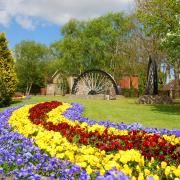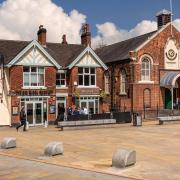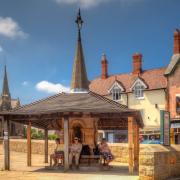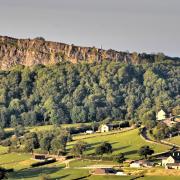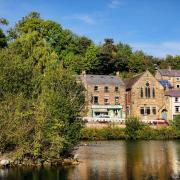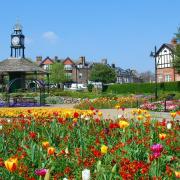Andrew Griffiths visits The Fishing House where Izaak Walton once fished with his young friend and pupil, Charles Cotton

Everybody has a home, where things began. For cricketers, it may be Lords. Footballers may say Wembley. If horse racing is your passion, you may think of it as Ascot. And if anglers were looking for such a place, an iconic venue which represented that point where it all began, where the ghosts of the great walk, they could do worse than choose the fishing house on the banks of the River Dove in Beresford Dale.
This small house, known as the Temple, stands on private ground but can be glimpsed through trees across the river from the footpath that leads through this sharply sculpted limestone gorge. The higher reaches of the Dove flow through some of the most impressive limestone landscape in the Peak, and there are some contenders.
The Temple is so significant for anglers because it was built by Charles Cotton, a 17th century poet and writer who lived at Beresford Hall, near Hartington. A fanatical fisherman himself, Cotton fished with Izaak Walton, author of The Compleat Angler, first published in 1653 and one of the most notable books ever written in the English language. Cotton himself wrote a second section for this book’s later editions based on his experiences of fishing the Dove and it is considered to be one of the finest early treatises on modern fly fishing. Its teachings are still applicable today – some of the fly patterns Cotton describes are still used by modern anglers.
Charles Cotton built the fishing house in 1674 to celebrate his friendship with Izaak Walton and their entwined initials are carved into the stone above the door, along with the inscription: ‘Piscatoribus Sacrum’, a sacred place for anglers, hence it is known in angling circles as ‘The Temple’. The Temple and the Dove feature in Cotton’s writings and represent his idea of angling heaven. This was Cotton’s spiritual home made real.

Cotton’s fame as a writer of burlesque poetry was enduring, as was his book The Compleat Gamester – a treatise on gambling games, which only began to fall out of favour in the early twentieth century. Given his trio of obsessions – raunchy writing, fishing and gambling – it is unsurprising that his later years were beset by financial difficulties and he died penniless in 1687. That’s fishermen for you.
Beresford Hall no longer stands. The Temple has recently been sold, along with the fishing rights to a three mile stretch of the Dove at Beresford, which includes the Temple Beat. The new owner wishes to remain anonymous, which is of course his right, but I can tell you that he works in finance and is an American fund manager based in London.
The Dove rises on Axe Edge moor above Buxton, and forms the boundary between Derbyshire and Staffordshire before joining the Trent at Burton. Summer water levels on the upper Dove have been low for a number of years now, largely due to reduced rainfall, and low water levels concentrate any pollution that is present. The main threat to water quality on the upper Dove has been caused by agricultural run-off.
This pollution source is now being addressed and hopefully the water quality will continue to maintain the steady improvement shown over the last ten years.

The new owner’s intention is to restore the fishery to something Cotton and Walton might recognise. It will be a wild fishery – no fish are stocked, and all fishing is catch and release. This sounds a simple aim, but in practice it means that the river needs to be ‘renaturalised’, so that it will provide a habitat rich in insect life and places of shelter to support fish at all stages of their life cycle. This takes quite a bit of work.
The man charged with doing this work I can name – he is riverkeeper Stephen Moores, and I met Stephen on a September morning at Beresford for a walk along the river. Stephen calls the rivers he looks after ‘home’. He has been a riverkeeper for 37 years, as was his father before him, much of their time spent on the southern chalk streams of the Test and the Itchen. These are the two rivers that are renowned internationally for their fly fishing, but interestingly, Stephen thinks that the Derbyshire limestone streams now offer the finest wild river fishing in the country.
Stephen has seen fashions come and go in the art and science of the riverkeeper, but is embracing the move towards the wild, self-sustaining fishery. As we walk along the riverbank, he points out the work going on to create the right habitat for the wild trout and grayling to spawn successfully and thrive. We stop at an old tree in the middle of the river.
‘This is a tree that fell in,’ he tells me. ‘When I started my career on the chalk streams, I would have been told to remove that, within a day probably. But things have changed totally, and certainly as far as wild fish are concerned, woody debris is the “in” word for river habitat management. So we leave as much as we can in the river, and we have gone full circle and now actually drop trees in the river.’

This ‘woody debris’ serves a number of functions. It breaks up the flow, provides a good breeding ground for the aquatic insects the fish need to eat, and it also offers shelter from predators for small fish.
The relationship between a riverkeeper and his river is an intimate one. Rivers are constantly changing environments and there is nobody better placed than the keeper to monitor those changes over time. Stephen is heavily involved in nature conservation and rings birds for the British Trust for Ornithology.
‘I think of this as my river,’ he says to me, as we walk along its bank. ‘If a keeper doesn’t think that way, he has missed out a lot in his life. All right I haven’t got the deeds for it, but as far as I am concerned, I have always said to any owner that once you have been there for a while it becomes your river.
‘And you should appreciate everything that goes around it. You don’t have to know the name of the plant or the name of the bird or insect necessarily, but if you don’t embrace the whole thing as a river keeper you are missing out, I think, big style.’
I know that Stephen has met our mysterious American financier, whom he tells me is a keen fly fisherman himself. He has already been on the river and caught a couple of trout. I ask Stephen what he thought of him – some might worry that he has bought it to just tuck it away in a portfolio somewhere as an investment, then forget about it.
Stephen doesn’t think so. ‘We were walking along a bit of the river, and he said: “Ah, I love this.” I looked up, thinking to myself that it wasn’t the best bit of water, then he said: “Because it reminds me of the river at home.” It was the river he fishes in New York. This is why he loves it, and I am sure he loves it because of the history. I get the impression he wants to look after it, he wants to enhance it.’
I did get to speak to the new owner over the telephone. A keen fly fisher, he was a history graduate originally, and he has a real sense of the significance of the place. He would like to restore the Temple building, more to how it was in Cotton’s day, but with a few ‘quirks’.
‘One of the things that interests me is how much is on offer locally – food, arts, craftsmen,’ he tells me. ‘Part of the fun would be to have local stonemasons help restore the Temple, and local pottery people making the crockery that goes in the place, and local carpenters making the panelling that replaces Cotton’s original panelling. There is a lot of local interest that can make the Temple and fishery even more charming and unique.’
The purchase of the Temple Beat has been a perfect introduction to our arcane legal system and the tangle of land ownership a long history can bring to light. Access to the Temple has always been restricted due to this patchwork of land ownership, but the new owner is looking forward to working together with his new neighbours.
But for all its beauty and historical significance, the Temple and its river remain unknown to many.
‘I took a couple of people there myself when I was up, and they said: “Oh my god I can’t believe I am actually here, I’ve wanted to come for so long,” and that’s kind of a pity,’ the new owner tells me.
He hopes the fishery will interest a growing number of anglers who share his interest in history and conservation. ‘I would like to have fishermen who want to come fish it and are only ever going to fish it once, and balance that with people who do actually value it as their home water, people who will look after it,’ he says.
Back on the river with Stephen Moores, we stop beside Pike Pool, where a shaft of limestone bursts out of the water like a spear. It is one of the most famous locations in angling literature and is described in The Compleat Angler. As a fly fisher – or just someone who is interested in history – you cannot fail to be other than a little awed, in the footsteps of Izaak Walton, when the river was bigger and stronger, when Cotton called this water ‘home’.
‘To think that they would have come along here with their willow sticks with a bit of horse hair tied to it and some sort of artificial bait, or even meat or a dead mouse to start with probably,’ says Stephen. ‘It is pretty incredible.’ It is.
The restoration of the upper Dove is a work in progress, and the fishing isn’t easy. It is one for the true fly fishing enthusiast who is as concerned with casting back through time to catch something of where it all began as casting out onto the water to winkle out the wild trout and grayling that swim there now.
‘It needs to be maintained and improved so that the fishing and the experience is at the standard of the history,’ the new owner tells me, at the end of our conversation.
Charles Cotton, another wealthy man who became lost in his pursuit of angling, would have surely approved. And look what happened there – what could possibly go wrong?












